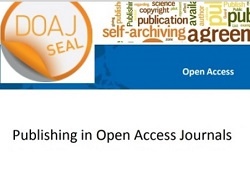Meeting the Directory of Open Access Journals (DOAJ) quality criteria in the global South

.jpg)
(Publishing in Open Access Journals, IDRC | CRDI)
Open Access is when publications are freely availble online to all at no cost and with limited restrictions with regards reuse. The Directory of Open Access Journals (DOAJ) is a community-curated online directory that indexes and provides access to high quality, open access, peer-reviewed journals. DOAJ quality seal criteria span five categories, ranging from the quality of the editorial process to copyright issues.
DOAJ provides a list of trusted, open access scholarly journals (about 12,000) from across the world, and from different disciplines. Journal Editors are encouraged to submit their journals for evaluation, and researchers and librarians are encouraged to use this DOAJ list accepted into DOAJ based on the new extended criteria as a valuable resource to identify journals to publish with, but also to find information from to advance further research.
It is easy to see exactly which journals are from which country, from which discipline, at any time, by downloading it in Excel (the file is updated every 30 minutes). Use the functions in Excel to sort data/clean as you wish, and more. OpenRefine is also an option to clean/manipulate data.
To learn more about the advancement of Open Access journal practices in the global South, please read and share the article The ambassadors for open access standards in the global South (SciDevNet, 27/09/18).
Please also encourage scholarly publication journals – especially from Africa – to consider applying for evaluation and inclusion into DOAJ. If the journal is already online and open access, please apply for the journal to be included in DOAJ by completing the online form. The African DOAJ Ambassadors would be more than prepared working with you in making your journal becoming DOAJ compliant. The DOAJ Ambassadors for the African continent include:
- Kamel Belhamel (North Africa) kamel@doaj.org
- Pascal Soubeiga (West Africa) pascal@doaj.org
- Solomon Mekonnen (East Africa) solomon@doaj.org
- Ina Smith (Southern Africa) ina@doaj.org
DOAJ has produced some educational videos for the wider community to learn about DOAJ and open access best practices : Check them out!
DID YOU KNOW that ... ...the DOAJ has become a reference for other initiatives designed to increase access to quality OA papers — such as Research4Life, a public-private partnership between UN agencies, universities and publishers? Since 2015, Research4Life only indexes OA journals if they meet the DOAJ’s rigorous criteria for journal quality and are included in the directory. “It is critical that Research4Life ensures that the journals we link to can be trusted to operate honestly and responsibly,” - says its director Richard Gedye. AGORA is one of the five programmes making up Research4Life. The other four Research4Life programmes are Hinari, OARE, GOALI and ARDI, covering research in health, environment, law, development and innovation. |
*** Ready for Open Access Week? 22-28 October 2018, Globally!
*** The Global Sustainability Coalition for Open Science Services (SCOSS) CALLS on the OPEN SCIENCE community to help identify field of potential applicants for second funding cycle (To be considered, all pre-applications must be submitted here by 31 October till 2018)
.jpg)
Open Access, Open Data, Open Science : Dive deeper :
- Learn about DOAJ and Open Access Best Practices
- DOAJ has decided to publish its strategy and objectives for 2018-2020. 3 Key Focus areas: funding and sustainability, stability and scalability, education & outreach
- FUNDER OPEN ACCESS PLATFORMS – A WELCOME INNOVATION?
- Public data in South Africa: Time to claim what’s ours
- Open access resources (The World Bank)
- South Africa is working towards the advancement of the OPEN SCIENCE agenda elsewhere on the continent
- African Open Science Platform (AOSP): The Future of Science and the Science of the Future
- The Open Speakers Database : find experts on Open Access, Open Education, and Open Data
- EC Statement: 'Plan S' and 'cOAlition S' – Accelerating the transition to full & immediate Open Access to scientific publications (September 2018)
- AIMS online courses on Fundamentals of Information Literacy and Access to Global Online Research in Agriculture; Open & Research Data
- An example of an Open Science initiative shared by Dr Edwards: Extreme Open Science Initiative: A team of groundbreaking scientists at SGC, UNC and INSERM are now sharing their lab notebooks online. Read more papers presented at the ELPUB2018 conference and benefit from the many messages and work done globally
- Open Science for early-career researchers, by O'Neill, Gareth; Hn tkov, Eva; Science Impact Ltd, Volume 2018, Number 6, August 2018, pp. 64-65
- Data Driving Sustainability – the African Open Science Platform Project/ Ina Smith & Susan Veldsman (ELPUB2018
- The OPEN SCIENCE Training Handbook (FOSTER)
- FOSTER RECOMMENDATIONS on OPEN SCIENCE TRAINING
- Implement effective Open Data & Keep it alive with Open Data TOOLKIT (see sub-section: Training & Guides on Open Data & Data Management & Use & Interoperability)
- Registries for Open Data Repositories, Institutional Repositories, Policies, Journals
- Free Open Science training courses
- The case for 'Open Science': Do we need intellectual property law?
- The Open Revolution: Rewriting the Rules of the Information Age (Open Access book by Rufus Pollock, A/E/T Press, June 2018)
The Coalition for Diversity and Inclusion in Scholarly Communications (C4DISC)
.jpg)
AIMS.FAO.ORG is looking forward towards creating awareness of the work done in Open Access, Open Data, Open Science through dialogue, capacity development, collaboration and diversity, - in this way science can be advanced much faster, addressing the SDGs (Sustainable Development Goals).
To keep up-to-date with AIMS news, please, Sign up for AIMS News, follow @AIMS_Community on Twitter.
And, thanks again for your interest !

